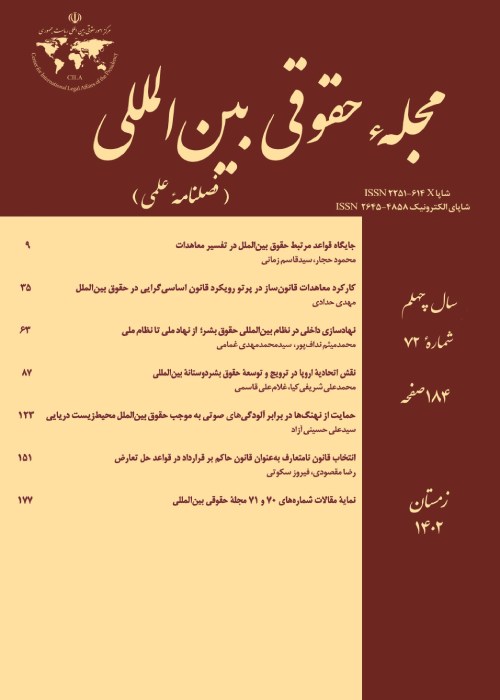Treaty Adherence: The Consent Principle and New Developments in Arms Control and Disarmament
Author(s):
Abstract:
The consent principle in international treaties is one of the fundamentals of the international treaty law. In accordance with this principle, every treaty is an aftermath of mutual consent of states and/or international organizations to obtain common goals and interests as a result of their cooperation. Hence, states and international organizations need to conclude a treaty, negotiate about its format and contents, stipulate their common views (with observance of international public order), and finally sign or ratify or verify it officially after the finalization of preliminary process of the treaty conclusion as a means of collective co-existence. In all stages, the significance of being voluntary is so much highlighted that affect the conclusion of every treaty especially when the lack of real will make the treaty not binding. There have been some developments in this principle from 1990. This article will analyze the aforesaid principle and its developments which impulses its fundamentals with emphasis at the international process of disarmament, arms control and from non-proliferation Weapons of Mass Destruction.However, certain practices within international organizations i.e. UN Security Council Resolutions 687 (1991) and 825 (1993) on the Weapons of Mass Destruction (WMD) capabilities in Iraq and North Korean Withdrawal from the Nuclear Non-Proliferation Treaty (NPT) respectively, and IAEA Board of Governors resolutions on Iranian nuclear program, prima facie seems to be new developments in this case. They called on and requested Iraq and Iran to enter into the Biological Weapons Convention (BWC) and Model Additional Protocol to the NPT Safeguard System respectively, and also non-withdrawal form the NPT by the North Korea.Are these resolutions in the field of arms control and disarmament as any legal developments in changing the voluntarism doctrine on the acceptance of international agreements codified in the Vienna Convention on the Law of Treaties? This paper, discusses this issue and concludes that they could not change that principle and then, treaty adherence is not legally binding yet.
Language:
Persian
Published:
International Law Review, Volume:22 Issue: 32, 2005
Page:
53
magiran.com/p237210
دانلود و مطالعه متن این مقاله با یکی از روشهای زیر امکان پذیر است:
اشتراک شخصی
با عضویت و پرداخت آنلاین حق اشتراک یکساله به مبلغ 1,390,000ريال میتوانید 70 عنوان مطلب دانلود کنید!
اشتراک سازمانی
به کتابخانه دانشگاه یا محل کار خود پیشنهاد کنید تا اشتراک سازمانی این پایگاه را برای دسترسی نامحدود همه کاربران به متن مطالب تهیه نمایند!
توجه!
- حق عضویت دریافتی صرف حمایت از نشریات عضو و نگهداری، تکمیل و توسعه مگیران میشود.
- پرداخت حق اشتراک و دانلود مقالات اجازه بازنشر آن در سایر رسانههای چاپی و دیجیتال را به کاربر نمیدهد.
In order to view content subscription is required
Personal subscription
Subscribe magiran.com for 70 € euros via PayPal and download 70 articles during a year.
Organization subscription
Please contact us to subscribe your university or library for unlimited access!


